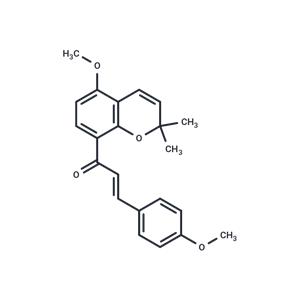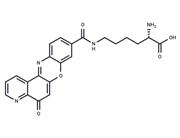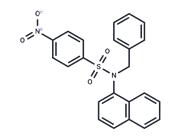| Name | Millepachine |
| Description | Millepachine is a natural product found in the Chinese herbal medicine with strong antitumor effects against numerous human cancer cells. |
| In vitro | Millepachine (2-8 μM; 24 h) inhibits ATP-binding cassette transporter activity in A2780CP cells. Millepachine (2-8 μM; 24 or 48 h) induces significant G2/M arrest and apoptosis of cisplatin-sensitive A2780S and cisplatin-resistant A2780CP cells. The percentage of cells in the G2/M fraction increased from 15.99% in vehicle cells to 24.93%, 60.67%, and 77.31% at dose of 2, 4, and 8 μM in A2780S cells, respectively. Millepachine (2-8 μM; 24 h) decreases topoisomerase II levels in A2780S and A2780CP cells. Millepachine (1.25-20 μM; 48 h) remarkably inhibits the proliferation of cisplatin-resistant A2780CP cells with an IC50 of 4 μM[1]. |
| In vivo | Millepachine (20 mg/kg; i.v.) reduced tumor volume and weight with inhibitory rates of 73.21% and 65.58% in A2780S and A2780CP xenograft models, respectively, and does not induce acquired drug resistance in an excised A2780S xenograft model[1]. |
| Storage | Powder: -20°C for 3 years | In solvent: -80°C for 1 year | Shipping with blue ice. |
| Solubility Information | DMSO : 100 mg/mL (285.38 mM), Sonication is recommended.
|
| Keywords | Chinese | Millettia | bioactive | chalcone | medicine | Millepachine | natural | Inhibitor | pachycarpa | inhibit | antitumor | herbal | Benth | Apoptosis | cancer |
| Inhibitors Related | Stavudine | 5-Fluorouracil | Myricetin | Meclizine dihydrochloride | Dextran sulfate sodium salt (MW 4500-5500) | Sodium 4-phenylbutyrate | L-Ascorbic acid | Metronidazole | Sorafenib | Tributyrin | Salicylic acid | Oleic acid |
| Related Compound Libraries | Anti-Tumor Natural Product Library | Flavonoid Natural Product Library | Traditional Chinese Medicine Monomer Library | Bioactive Compound Library | Selected Plant-Sourced Compound Library | Natural Product Library | Bioactive Compounds Library Max | Anti-Cancer Active Compound Library |

 United States
United States



